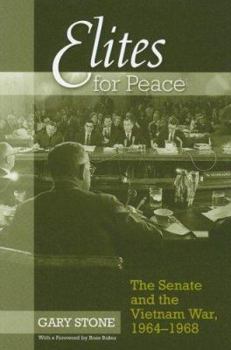Elites for Peace: The Senate and the Vietnam War, 1964-1968
The Vietnam War was the largest American military interventions since World War II and the most controversial American war since the Civil War. The controversy has outlived the war's end and its memory has resonated in discussions of every American intervention since then.Unsurprisingly, interest in the Vietnam War has also spawned numerous books on various aspects of the conflict, but to date no book has been published focusing on the United States Senate even though the war could not have taken place without the Senate's support. Gary Stone's Elites for Peace fills this gap, giving special attention to the Senate during the Johnson presidency when the conflict escalated into a major war and became the central political issue of American political life and a major concern for people throughout the world.. In this work, Stone chronicles how the Senate tried to cope with this war, a war to which its members supported through the nearly unanimous Gulf of Tonkin Resolution in 1964, and, more concretely, by supplying the vast appropriations needed to sustain America's continuing intervention. Looking beyond the public acquiescence of most senators, Stone shows that numerous influential senators actually opposed Johnson's policies as early as 1965. By early 1966, through the televised Fulbright hearings and publicized dissension of Senator Robert F. Kennedy, the Senate helped to legitimize public debate about the war and give respectability to the still small antiwar protest movement, a movement which would grow to mass proportions in years that followed. The reader of Elites for Peace will inevitably be struck by the numerous war-related issues that engaged senators that resonate in more recent American military interventions, among them the credibility of official justifications for intervention, the delineation of the goal of the intervention, the role of the United Nations and international law, the conflicting claimed prerogative of Congress and the President, and such problems as civilian casualties, the treatment of prisoners, the problem of foreign intervention into a country in a state of civil war, and the tendency of the United States actions to be determined by the wishes of its client state rather than the reverse. Among the episodes and developments covered are the Senate's response to giving American aid to the French government in the first Indochina War in 1953-54, the debate on the Gulf of Tonkin Resolution in 1964 and on the escalation of the war in the following year, the televised Foreign Relations Committee hearings of 1966, the role of Vietnam as an issue in the Senate elections held later that year, the 1967 Armed Services Committee hearings on the air war, and the role of the Senate in decisions made by the president in the aftermath of the 1968 Tet offensive. Stone places the Vietnam debates in the context of the evolution of postwar foreign debates, both within and outside of the Senate, with special attention to such influential leaders of elite opinion as the columnist Walter Lippmann. Stone challenges the widely held view that the opposition of senators in the wake of the Tet offensive represented a sudden break in a bipartisan consensus that had guided American foreign policy since the onset of the Cold War. Instead, he presents evidence showingthat most mainstream Republicans were, at most, equivocal in their support to the worldwide anti-Communist crusade on behalf of the cause of the Free World from the time their support for vigorous anti-Communism was first called for by Harry Truman in 1947.As a work that is both scholarly and written in an engaging and accessible style that is free of jargon, Elites for Peace will be of great interest to all of those who are concerned with the problem of war and the course of American foreign policy, as well as historians, political scientists, students of language and communication, and scholars particularly concerned with the study of peace and
Format:Hardcover
Language:English
ISBN:1572335793
ISBN13:9781572335790
Release Date:June 2007
Publisher:Univ Tennessee Press
Length:302 Pages
Weight:1.30 lbs.
Dimensions:1.0" x 6.0" x 9.0"
Customer Reviews
0 rating





